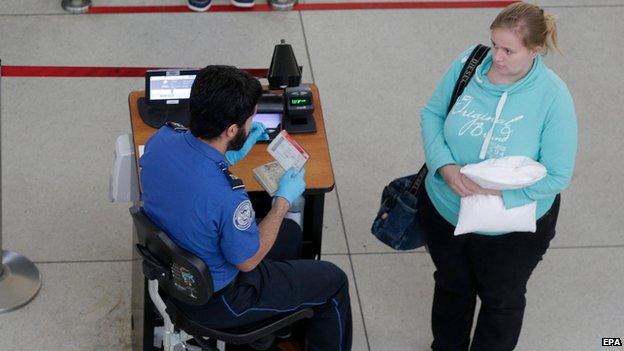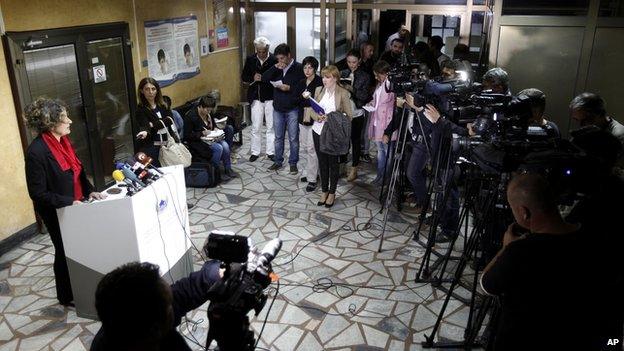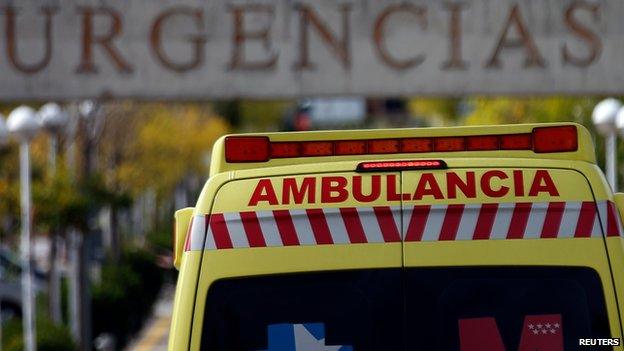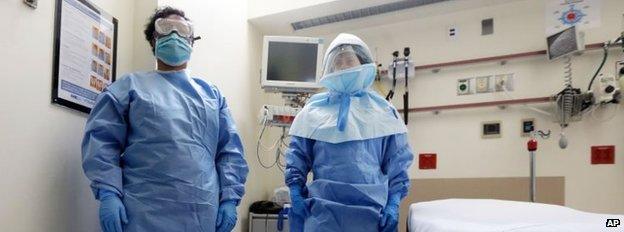UK Ebola screening for arrivals from affected areas
- Published

The US is also implementing checks for passengers arriving at some American airports
People arriving in the UK from areas hit by Ebola face "enhanced screening" for the virus at Heathrow, Gatwick and Eurostar terminals.
Downing Street said passengers would be asked questions and potentially given a medical assessment.
It comes as Whitehall sources say it is "very unlikely" a British man who died in Macedonia on Thursday could have contracted the disease.
The UK Foreign Office had said it was urgently investigating the reports.
The unnamed man, who Macedonian authorities said was 57, was admitted to hospital at 15:00 local time (14:00 BST) and died two hours later, the country's health ministry said.
He had been vomiting, had a fever and was bleeding internally.
There were "high chances" it was not an Ebola case, the the ministry added.
But in a statement it said officials had followed World Health Organization procedure in closing the hotel where the man was staying and placing the residents in quarantine.

Jovanka Kostovska of the Macedonian Health Ministry has been addressing the media in capital Skopje
A Macedonian government spokesman said the man's travelling companion - also British and aged 72 according to authorities - said they had travelled directly from the UK to Skopje and had not been to any affected areas. He is under observation in hospital, as is the ambulance crew who treated the dead man.
Dr Brian McCloskey, from Public Health England, said he was aware of the reports but added: "We understand Ebola to be unlikely as the cause of death but will continue to work with partners to investigate."
The outbreak has already killed more than 3,000 people and infected more than 7,200 - mostly in West Africa.
People leaving areas affected by the outbreak have been subject to checks for some weeks, although people do not become infectious until they display symptoms.
Earlier this week a Spanish nurse became the first person to contract the deadly virus outside of West Africa.

The condition of a Spanish nurse with the virus has worsened, according to the hospital treating her
Ministers had ruled out introducing screening at UK airports, pointing out that government policy was in line with advice from the World Health Organization.
A statement on the Department of Health's website, external also said: "Entry screening in the UK is not recommended by the World Health Organization, and there are no plans to introduce entry screening for Ebola in the UK."
But in a statement, Number 10 said advice from the chief medical officer was that checks on arrivals would "offer an additional level of protection to the UK".
Keith Vaz: "With the greatest respect to the WHO, a virus does not wait for a direct flight"
The new checks - for those arriving from Liberia, Sierra Leone or Guinea - will involve "assessing passengers' recent travel history, who they have been in contact with and onward travel arrangements", Downing Street said.
Passengers could also be subject to medical checks "by trained medical personnel rather than Border Force staff" and will be given advice on "what to do should they develop symptoms later".
The move was criticised by Conservative MP Rory Stewart, who told Channel 4 News: "It doesn't make sense to only screen limited places."

Analysis

By James Gallagher, health editor, BBC News website
The UK's stance on screening has shifted rapidly.
As recently as two days ago Public Health England was saying firmly there were no plans for screening arrivals.
The argument being there was exit-screening in affected countries, the WHO said it was unnecessary and it would mean screening "huge numbers of low-risk people".
But now there will be "enhanced screening" for arrivals from affected countries.
So what has changed?
The chief medical officer argues concern over rising numbers of cases justifies the move, although it is not clear what assessment of the threat to the UK has changed since Tuesday.
However, some scientists have argued the move is more political than scientific

BBC transport correspondent Richard Westcott said the announcement was more about looking like something was being done than stopping the disease's spread.
Medical experts say the chances of someone boarding a flight with no symptoms and being contagious by the time they land was "highly, highly unlikely", our correspondent added.
'Ineffectual tool'
In the US temperature checks and questionnaires were introduced earlier this week for passengers arriving at some airports from Liberia, Sierra Leone and Guinea.
But speaking on BBC Radio 4's World at One, chairman of the government's Advisory Committee on Dangerous Pathogens Prof George Griffin said temperature tests were "a very ineffectual tool".
"We know the clinical course of the disease now very well, a maximum incubation period of 21 days, and fever is only part of the clinical syndrome at the end of that period."
And the chairman of Public Health England Prof David Heymann said similar attempts to combat the life-threatening Sars virus in 2003 had been ineffective.
"Very few people were actually found who were infected," he added.
"In fact, there's no record of anybody in most countries having been shown to be infected with Sars when they crossed the border."